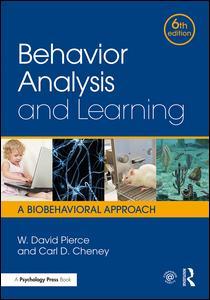Behavior Analysis and Learning (6th Ed.) A Biobehavioral Approach, Sixth Edition
Auteurs : Pierce W. David, Cheney Carl D.

Using a consistent Skinnerian perspective, Behavior Analysis and Learning: A Biobehavioral Approach, Sixth Edition provides an advanced introduction to the principles of behavior analysis and learned behaviors, covering a full range of principles from basic respondent and operant conditioning through applied behavior analysis into cultural design. The textbook uses Darwinian, neurophysiological, and biological theories and research to inform B. F. Skinner?s philosophy of radical behaviorism.
The sixth edition expands focus on neurophysiological mechanisms and their relation to the experimental analysis of behavior, providing updated studies and references to reflect current expansions and changes in the field of behavior analysis. By bringing together ideas from behavior analysis, neuroscience, and epigenetics under a selectionist framework, this textbook facilitates understanding of behavior at environmental, genetic, and neurophysiological levels. This "grand synthesis" of behavior, neuroscience, and neurobiology roots behavior firmly in biology. The book includes special sections, "New Directions," "Focus On," "Note On," "On the Applied Side," and "Advanced Section," which enhance student learning and provide greater insight on specific topics.
This book is a valuable resource for advanced undergraduate and graduate students in psychology or other behavior-based disciplines, especially behavioral neuroscience. For additional resources to use alongside the textbook, consult the Companion Website at www.routledge.com/cw/pierce.
1. A Science of Behavior: Perspective, History, and Assumptions 2. The Experimental Analysis of Behavior 3. Reflexive Behavior and Respondent Conditioning 4. Reinforcement and Extinction of Operant Behavior 5. Schedules of Reinforcement 6. Aversive Control of Behavior 7. Operant–Respondent Interrelationships: The Biological Context of Conditioning 8. Stimulus Control 9. Choice and Preference 10. Conditioned Reinforcement 11. Correspondence Relations: Imitation and Rule-Governed Behavior 12. Verbal Behavior 13. Applied Behavior Analysis 14. Three Levels of Selection: Biology, Behavior, and Culture
W. David Pierce is Professor, Emeritus, of Sociology at the University of Alberta, Canada. He has investigated a biobehavioral model of activity anorexia, exercise-induced taste aversion, and behavioral-neurometabolic determinants of obesity. Currently, his research is focused on wheel-running reinforcement, the response deprivation hypothesis, and extensions of behavioral momentum theory.
Carl D. Cheney is Professor, Emeritus, of Psychology at Utah State University, USA. He taught behavior analysis and physiological psychology, and published widely in the experimental analysis of behavior—conducting basic analyses of predator-prey interactions, diet selection in domestic livestock, as well as reinforcement-schedule alterations and transitions in humans. His current research is focused on encouraging the wider use of behavior analysis in all appropriate situations.
Date de parution : 06-2017
17.8x25.4 cm
Disponible chez l'éditeur (délai d'approvisionnement : 14 jours).
Prix indicatif 209,69 €
Ajouter au panierThème de Behavior Analysis and Learning :
Mots-clés :
Behavior Analysts; Pierce; Discriminative Stimulus; Cheney; Lever Presses; W; David Pierce; Mechner Notation; Carl D; Cheney; Vi Schedule; Behavior Analysis and Learning; Key Pecks; Applied Behavior Analysis; DNA Methylation; FAPs; Adjunctive Behavior; Stimulus Class; Learned Helplessness; Concurrent Chain Schedules; Generalized Matching Law; Conditioned Reinforcer; Terminal Link; Generalized Imitation; Obese Prone Rats; Matching Law; Concurrent Schedules; Derived Stimulus Relations; CR; Taste Aversion Learning; EIBI; Delay Discounting



